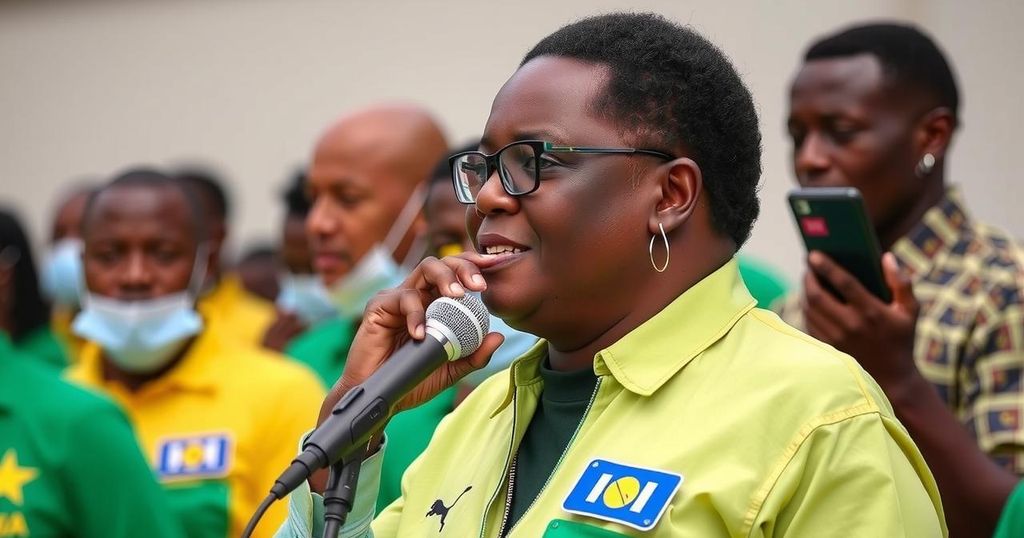Gabon’s military junta announced that 91.8% of voters approved a new constitution in a referendum, with a turnout of 53.54%. The constitution limits presidential terms, abolishes the prime minister role, and restricts candidates to Gabonese citizens with Gabonese spouses. Critics argue it paves the way for authoritarian rule. Transitional President Oligui aims for a return to civilian governance by 2025, amid ongoing public discontent over governance issues and unemployment.
Gabon’s military-led authorities announced that the new constitution has received overwhelming approval in a recent referendum, as indicated by provisional results released on Sunday. Approximately 860,000 registered voters participated, encouraged by extensive outreach from the government urging them to make their choices clear. The newly proposed constitution delineates a limit of two seven-year presidential terms, abolishes the position of prime minister, and prohibits dynastic succession of power. According to the Committee for the Transition and Restoration of Institutions, 91.8 percent of voters supported the constitution, while the interior ministry reported a voter turnout of 53.54 percent.
In the lead-up to the vote, the campaign was marked by significant official propaganda from the junta, which took control after a coup in August of the previous year. The referendum was viewed critically by some media and opposition voices, who questioned the legitimacy of the turnout figures. However, no significant disturbances were reported during the voting process across 2,835 polling locations nationwide, where the voting stations remained open until 6:00 PM.
The new constitutional provisions include stipulations that presidential candidates must be solely Gabonese citizens, possessing at least one Gabonese parent and a Gabonese spouse. This criterion excludes former President Ali Bongo Ondimba, who is married to a French national, along with their children. Transitional President Brice Oligui Nguema heralded the referendum as a pivotal moment for Gabon’s progress while revealing his intention to restore civilian rule after a two-year transition period, though he has shown aspirations for the presidential election slated for August of 2025.
Critics of the proposed constitution assert that it has been deliberately structured to facilitate strongman governance. Nathalie Badzoko, a civil servant, expressed her support for the junta, despite admitting she had not fully reviewed the new constitution’s extensive details. Lawyer Marlene Fabienne Essola Efountame cautioned against the potential emergence of dictatorship due to the constitution’s design.
The junta emphasized its efforts to ensure a fair referendum and invited international observers. Citizens voiced their concerns regarding various issues, predominantly unemployment and living costs. Recent surveys indicated that nearly 87 percent of respondents feel Gabon is on the right track, with significant confidence in President Oligui. The final results of the referendum will be confirmed by the constitutional court, marking a significant milestone in Gabon’s political landscape.
The recent constitutional referendum in Gabon follows a tumultuous political period characterized by a military coup that ousted former President Ali Bongo Ondimba. The junta, now in control, has proposed a new constitution aimed at establishing a more structured political environment, limiting presidential terms, and addressing long-standing issues of governance and succession. This constitutional development reflects broader aspirations for political reform amidst a context of public discontent over economic challenges and governance failures. Claims of corruption and mismanagement were rampant under Bongo’s rule, which lasted for 14 years after succeeding his father, Omar Bongo, who had held power for over four decades. The current transitional leader, Brice Oligui Nguema, asserts the referendum signals a move towards a more democratic governance model.
In conclusion, the preliminary results of Gabon’s constitutional referendum indicate overwhelming support for the new constitution, a significant shift for the nation following a period of military rule. The proposed changes aim to impose limitations on presidential tenure and establish clearer eligibility criteria for future candidates. As Gabon navigates this transitional phase, the success of these reforms will hinge on maintaining transparency and addressing the pressing socio-economic concerns faced by its citizens. Observations regarding the referendum’s legitimacy and the junta’s intentions will continue to be of paramount importance in the forthcoming political landscape.
Original Source: www.tiogapublishing.com






